Books on consciousness
A list of books relating to the hard problem of consciousness. Regularly updated cos I keep finding new stuff all the time.
A list of books relating to the hard problem of consciousness. Regularly updated cos I keep finding new stuff all the time.
2003
 Bina Gupta
Bina Gupta
Cit: Consciousness
(Oxford 2003)
An examination of the myriad conceptions of consciousness (or cit, in Sanskrit) found in classical Indian philosophy. Gupta introduces reader to classical Indian theories of consciousness and situates them within modern debates on the topic. This thought-provoking work is a natural extension of her 1998 study, The Disinterested Witness. See Google | Internet Archive
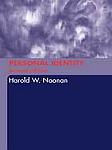 Harold W. Noonan
Harold W. Noonan
Personal Identity
(Routledge 2003, 2nd edition)
A comprehensive introduction that locates the problem of personal identity in the context of more general puzzles about identity and discusses the major historical theories and more recent debates. This edition contains a new chapter on ‘animalism’ and a new section on vagueness. Original edition 1989. See Routledge | Google | Routledge (3rd edition 2019) | Google (3rd edition 2019)
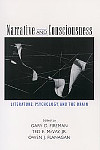 Fireman, McVay Jr. & Flanagan (eds.)
Fireman, McVay Jr. & Flanagan (eds.)
Narrative and Consciousness: Literature, Psychology and the Brain
(Oxford 2003)
We define our conscious experience by constructing narratives about ourselves and those with whom we interact. Conscious experience is not merely linked to these narratives but is subsumed by them. This volume gathers scholars in literary theory, psychology, and neuroscience to examine how stories are constructed, structure lived experience, and are rooted in the human body. See Oxford | Amazon | Google
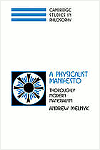 Andrew Melnyk
Andrew Melnyk
A Physicalist Manifesto: Thoroughly Modern Materialism
(Cambridge 2003)
A full treatment of the view that everything is physical. Melnyk argues that physicalism is best formulated by appeal to a notion of realization, rather than supervenience; that it must be importantly reductionist; that it need not repudiate causal and explanatory claims framed in non-physical language; and that it has the a posteriori status of a broad-scope scientific hypothesis. See Cambridge | Amazon | Google
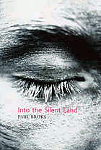 Paul Broks
Paul Broks
Into the Silent Land: Travels in Neuropsychology
(Atlantic 2003)
How does the brain construct a “self,” the essence of who we are? And how does the self respond to the deconstruction of its brain? A neuropsychologist with twenty-five years’ experience, Paul Broks writes with a doctor’s precision and clarity in a series of narravtives about the fascinating world of the neurologically impaired, delving not only into the inner lives of his patients but into a deeper understanding of how we define who we are. See Amazon | Google
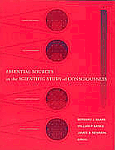 Baars, Banks & Newman (eds.)
Baars, Banks & Newman (eds.)
Essential Sources in the Scientific Study of Consciousness
(MIT 2003)
Consciousness is at the very core of the human condition. Yet only in recent decades has it become a major focus in the brain and behavioral sciences. Scientists now know that consciousness involves many levels of brain functioning, from brainstem to cortex. The almost seventy articles in this book reflect the breadth and depth of this burgeoning field. See MIT | Amazon | Google
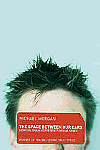 Michael Morgan
Michael Morgan
The Space Between Our Ears: How the Brain Represents Visual Space
(Weidenfeld & Nicholson 2003)
Explains how our brain interprets what we see. Using a wealth of sources from over the centuries including philosophical writings, scientific thinking, experiments, passages from poems and novels, and scenes from films, Morgan reveals the difficulty in working out exactly how we make and receive our visual perceptions. A revelatory overview of what we know about how the brain works regarding visual space. See Amazon | Google
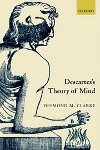 Desmond M. Clarke
Desmond M. Clarke
Descartes’s Theory of Mind
(Oxford 2003)
Descartes is commonly read as the paradigm defender of substance dualism, a theory caricatured by Ryle as the ‘dogma of the ghost in the machine.’ On this reading, mind and body are defined in such a way that they have no common properties that might help explain how they interact. Apart from its intrinsic implausibility, Clarke offers good reasons for thinking that this cannot have been Descartes’s view. See Oxford | Amazon | Google
 Jason Holt
Jason Holt
Blindsight and the Nature of Consciousness
(Broadview Press 2003)
Blindsight has been the source of great controversy in the philosophy of mind, psychology, and the neurosciences. Despite being widely acknowledged to be a critical test-case for theories of mind, this book is the first extended treatment of the phenomenon from a philosophical perspective. Holt argues, against much received wisdom, for a thorough-going materialism – the view not only that mental states are brain states, but (much more controversially) that mental properties are physical as well. See Broadview Press | Amazon | Google
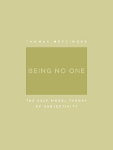 Thomas Metzinger
Thomas Metzinger
Being No One: The Self-Model Theory of Subjectivity
(MIT 2003)
According to Metzinger, no such things as selves exist in the world: nobody ever had or was a self. All that exists are phenomenal selves, as they appear in conscious experience. The phenomenal self, however, is not a thing but an ongoing process; it is the content of a “transparent self-model.” See MIT | Amazon | Google
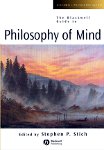 Stephen Stich & Ted Warfield (eds.)
Stephen Stich & Ted Warfield (eds.)
The Blackwell Guide to Philosophy of Mind
(Wiley 2003)
Comprising a series of specially commissioned chapters by leading scholars, this comprehensive volume presents an up-to-date survey of the central themes in the philosophy of mind. It leads the reader through a broad range of topics, including Artificial Intelligence, Consciousness, Dualism, Emotions, Folk Psychology, Free Will, Individualism, Personal Identity and The Mind-Body Problem. See Wiley | Amazon | Google
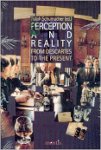 Ralph Schumacher (ed.)
Ralph Schumacher (ed.)
Perception and Reality: From Descartes to the Present
(Mentis Verlag 2003)
This book focuses on five questions about sensory perception: 1) What distinguishes sensory perception from other mental states? 2) What explains the intentionality of perceptual states? 3) What is the nature of perceptual content? (4) In what ways do the objects of sensory perception depend on the constitution of the perceiver? (5) How do we account for the intentionality of misperceptions? These questions are addressed through the interpretation of historical texts as well as by systematic reflection. See Mentis Verlag | Google
 Michael Tye
Michael Tye
Consciousness and Persons
(MIT 2003)
Tye takes on the thorny issue of the unity of consciousness and answers these important questions: What exactly is the unity of consciousness? Can a single person have a divided consciousness? What is a single person? Includes discussions of split-brain subjects and an appendix on the general representational approach to consciousness because of the relevance of representationalism to the theory of unity being adanced. See MIT | Amazon | Google
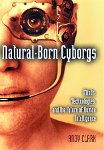 Andy Clark
Andy Clark
Natural-Born Cyborgs
(Oxford 2003)
Clark reveals how our technology is inseparable from who we are and how we think. As we enter an age of wearable computers, sensory augmentation, thought-controlled prosthetics, and rapid-fire information search and retrieval, the line between the user and her tools grows thinner day by day. “This double whammy of plastic brains and increasingly responsive tools creates an unprecedented opportunity for ever-closer kinds of human-machine merger,” Clark writes, arguing that such a merger is entirely natural. See Oxford | Google
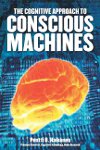 Pentti O. Haikonen
Pentti O. Haikonen
The Cognitive Approach to Conscious Machines
(Imprint 2003)
Haikonen argues that true conscious machines can be built, but rejects artificial intelligence and classical neural networks in favour of the emulation of the cognitive processes of the brain – the flow of inner speech, imagery and emotions. The result is a non-numeric meaning-processing machine with distributed information representation and system reactions. He argues that this machine would be conscious; it would be aware of its own existence and its mental content and perceive this as immaterial. See Imprint | Google
 Antonio R. Damasio
Antonio R. Damasio
Looking for Spinoza: Joy, Sorrow, and the Feeling Brain
(Vintage 2003)
Joy, sorrow, jealousy and awe – these and other feelings are the stuff of our daily lives. Presumed to be too private for science to explain and not to be essential for comprehending human rationality and understanding, they have largely been ignored. But not by the great 17-century Dutch philosopher Spinoza. And not by Damasio, who draws on his innovative research and experience with neurological patients to examine how feelings and emotions support the governance of human affairs. See Vintage | Google
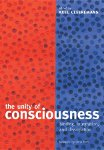 Axel Cleeremans (ed.)
Axel Cleeremans (ed.)
The Unity of Consciousness
(Oxford 2003)
Consciousness has many elements, from sensory experiences like vision and bodily sensation, to nonsensory aspects like emotion and thought. Their apparent unity is striking; all are presented as experiences of a single subject, contained within a unified field. But this apparent unity raises many questions. With chapters from some of the leading thinkers on consciousness, this thought-provoking book attempts to answer some of them. See Oxford | Google
 Evan Thompson (ed.)
Evan Thompson (ed.)
The Problem of Consciousness: New Essays in Phenomenological Philosophy of Mind
(U Calgary 2003)
Contributors to the Canadian Journal of Philosophy (Supplementary Vol. 29) explore consciousness and its relation to the natural world from the perspective of phenomenological philosophy of mind, an approach that integrates phenomenology, analytic philosophy, and cognitive science. A variety of nuances concerning consciousness are explored, including time consciousness, perception, schizophrenia, empathy, and intersubjectivity. See Amazon | Google
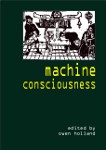 Owen Holland (ed.)
Owen Holland (ed.)
Machine Consciousness
(Imprint 2003)
Can a machine really have feelings? Well, even a humble thermostat knows when it gets too hot – and can do something about it. But can a machine think? Does it have a personality? How would you know? In this collection of essays, an international array of computer and brain scientists, actively working from both the machine and human ends of things, attempt to bridge the gap between mind and machine. See Imprint | Google
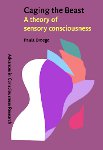 Paula Droege
Paula Droege
Caging the Beast: A Theory of Sensory Consciousness
(John Benjamins 2003)
How could a physical brain produce conscious sensory states that exhibit the rich and luxurious qualities of red velvet, a Mozart concerto or fresh-brewed coffee? After arguing against accounts of consciousness in terms of higher-order representation of mental states, Droege proposes that sensory consciousness is a special way we have of representing the world, and introduces a way of thinking about subjectivity as separate and more fundamental than consciousness. See John Benjamins | Google
 Paul S. MacDonald
Paul S. MacDonald
History of the Concept of Mind, Volume 1
(Ashgate 2003)
In the 20th century theorists were almost exclusively concerned with various versions of the materialist thesis, but prior to the current debates accounts of soul and mind reveal an extraordinary richness and complexity which bear careful and impartial investigation. This book is the first comprehensive, single-authored work to examine the historical, linguistic and conceptual issues involved in exploring the basic features of the human mind - from its most remote origins, to the beginning of the modern period. See Ashgate | Amazon | Google
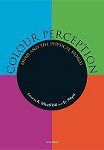 R. Mausfeld & D. Heyer (eds.)
R. Mausfeld & D. Heyer (eds.)
Colour Perception: Mind and the Physical World
(Oxford 2003)
A state of the art review of colour and colour perception. Leading scholars from cognitive psychology, philosophy, neurophysiology and computational vision provide an overview of the contemporary developments in our understanding of colours and of the relationship between the mental and the physical. With each chapter followed by critical commentaries, the volume presents a lively and accessible picture of the intellectual traditions which have shaped research into colour perception. See Oxford | Google | Amazon | Colin Clifford review
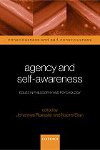 J. Roessler and N. Eilan (eds.)
J. Roessler and N. Eilan (eds.)
Agency and Self-Awareness
(Oxford 2003)
Leading philosophers and psychologists investigate a set of problems to do with agency and self-awareness in seventeen specially written essays. Much psychological and neurological work purports to show that consciousness and self-awareness play no role in causing actions, and to demonstrate that free will is an illusion. The essays in this volume subject the assumptions that motivate such claims to careful scrutiny. See Oxford | Google | Amazon
 Brie Gertler
Brie Gertler
Priveleged Access: Philosophical Accounts of Self-Knowledge
(Ashgate 2003)
How do you grasp the contents of your mind - your desires, your fears, your sensations, your beliefs? We typically think that we are better able to discern our own mental states than others are. But is this correct? And if it is, what explains your special or ‘privileged’ access to your own states. Priveleged Access is a comprehensive anthology of new and seminal essays, by leading philosophers on the nature of self-knowledge. See Ashgate | Google | Amazon
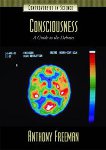 Anthony Freeman
Anthony Freeman
Consciousness: A Guide to the Debates
(ABC-CLIO 2003)
Once the domain of philosophers, the study of consciousness is now an exciting branch of science. Anthony Freeman, managing editor of the Journal of Consciousness Studies, begins with a history of mind study, from the ancient Greeks to the present, and provides a multidisciplinary review of cognitive science. Freeman untangles the conflicting theories on the working of the brain, analyzing the techniques developed for its study over the years. See ABC-CLIO | Google | Amazon
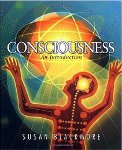 Susan Blackmore
Susan Blackmore
Consciousness: An Introduction
(Oxford 2003)
The first book of its kind to bring together all major theories of consciousness, from those based on neuroscience to those based on quantum theory or Eastern philosophy. Blackmore examines how subjective experiences arise from objective brain processes, the basic neuroscience of consciousness, altered states of consciousness, out-of-body and near-death experiences, drugs, dreams and meditation. She also explores the nature of self, the possibility of artificial consciousness in robots, and the question of whether animals are conscious. See Susan Blackmore’s site | Google | Amazon
 Barry Maund
Barry Maund
Perception
(McGill-Queen’s 2003)
An account of the major issues in the philosophy of perception, highlighting their importance in a range of philosophical fields - including epistemology, metaphysics, and the philosophy of mind - while respecting the historical dimension of the subject. See McGill-Queen’s | Google | Amazon
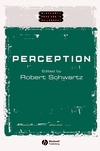 Robert Schwartz (ed.)
Robert Schwartz (ed.)
Perception
(Wiley-Blackwell 2003)
An anthology of classic writings on the conceptual and theoretical problems in the study of vision from influential philosophers and psychologists, extending from Aristotle to the present. See Wiley | Google | Amazon
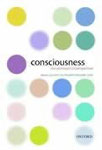 Q. Smith & A. Jokic (eds.)
Q. Smith & A. Jokic (eds.)
Consciousness: New Philosophical Perspectives
(Oxford 2003)
Consciousness is perhaps the most puzzling problem we face in trying to understand ourselves. Eighteen essays offer new angles on the subject. See Oxford University Press | Amazon
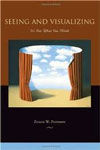 Zenon W. Pylyshyn
Zenon W. Pylyshyn
Seeing and Visualizing – It’s Not What you Think
(MIT 2003)
The message of this book is that seeing is different from thinking and that to see is not, as it often seems to us, to create an inner replica of the world we are observing or thinking about or visualizing. See MIT Press | Amazon | Google Books | Metapsychology (review)
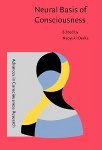 Naoyuki Osaka (ed.)
Naoyuki Osaka (ed.)
Neural Basis of Consciousness
(John Benjamins 2003)
Recent advances in cognitive neuroscience make possible an understanding of the neural events that are associated with various different forms of consciousness. This volume provides an overview of the neural and quantum bases of the conscious mind. Each chapter reviews findings concerning the mechanisms of different varieties of consciousness. See John Benjamins | Google
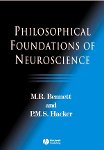 M. R. Bennett & P. M. S. Hacker
M. R. Bennett & P. M. S. Hacker
Philosophical Foundations of Neuroscience
(Wiley 2003)
A philosopher and a neuroscientist outline the conceptual problems at the heart of cognitive neuroscience. They provide a critical overview of the conceptual difficulties encountered in many current neuroscientific and psychological theories and propose that conceptual confusions about how the brain relates to the mind affect the intelligibility of research carried out by neuroscientists, infecting the questions they address, the interpretation of results and the conclusions they draw. See Wiley | Amazon | Google

Cit: Consciousness
(Oxford 2003)
An examination of the myriad conceptions of consciousness (or cit, in Sanskrit) found in classical Indian philosophy. Gupta introduces reader to classical Indian theories of consciousness and situates them within modern debates on the topic. This thought-provoking work is a natural extension of her 1998 study, The Disinterested Witness. See Google | Internet Archive

Personal Identity
(Routledge 2003, 2nd edition)
A comprehensive introduction that locates the problem of personal identity in the context of more general puzzles about identity and discusses the major historical theories and more recent debates. This edition contains a new chapter on ‘animalism’ and a new section on vagueness. Original edition 1989. See Routledge | Google | Routledge (3rd edition 2019) | Google (3rd edition 2019)

Narrative and Consciousness: Literature, Psychology and the Brain
(Oxford 2003)
We define our conscious experience by constructing narratives about ourselves and those with whom we interact. Conscious experience is not merely linked to these narratives but is subsumed by them. This volume gathers scholars in literary theory, psychology, and neuroscience to examine how stories are constructed, structure lived experience, and are rooted in the human body. See Oxford | Amazon | Google

A Physicalist Manifesto: Thoroughly Modern Materialism
(Cambridge 2003)
A full treatment of the view that everything is physical. Melnyk argues that physicalism is best formulated by appeal to a notion of realization, rather than supervenience; that it must be importantly reductionist; that it need not repudiate causal and explanatory claims framed in non-physical language; and that it has the a posteriori status of a broad-scope scientific hypothesis. See Cambridge | Amazon | Google

Into the Silent Land: Travels in Neuropsychology
(Atlantic 2003)
How does the brain construct a “self,” the essence of who we are? And how does the self respond to the deconstruction of its brain? A neuropsychologist with twenty-five years’ experience, Paul Broks writes with a doctor’s precision and clarity in a series of narravtives about the fascinating world of the neurologically impaired, delving not only into the inner lives of his patients but into a deeper understanding of how we define who we are. See Amazon | Google

Essential Sources in the Scientific Study of Consciousness
(MIT 2003)

Consciousness is at the very core of the human condition. Yet only in recent decades has it become a major focus in the brain and behavioral sciences. Scientists now know that consciousness involves many levels of brain functioning, from brainstem to cortex. The almost seventy articles in this book reflect the breadth and depth of this burgeoning field. See MIT | Amazon | Google

The Space Between Our Ears: How the Brain Represents Visual Space
(Weidenfeld & Nicholson 2003)
Explains how our brain interprets what we see. Using a wealth of sources from over the centuries including philosophical writings, scientific thinking, experiments, passages from poems and novels, and scenes from films, Morgan reveals the difficulty in working out exactly how we make and receive our visual perceptions. A revelatory overview of what we know about how the brain works regarding visual space. See Amazon | Google

Descartes’s Theory of Mind
(Oxford 2003)
Descartes is commonly read as the paradigm defender of substance dualism, a theory caricatured by Ryle as the ‘dogma of the ghost in the machine.’ On this reading, mind and body are defined in such a way that they have no common properties that might help explain how they interact. Apart from its intrinsic implausibility, Clarke offers good reasons for thinking that this cannot have been Descartes’s view. See Oxford | Amazon | Google

Blindsight and the Nature of Consciousness
(Broadview Press 2003)
Blindsight has been the source of great controversy in the philosophy of mind, psychology, and the neurosciences. Despite being widely acknowledged to be a critical test-case for theories of mind, this book is the first extended treatment of the phenomenon from a philosophical perspective. Holt argues, against much received wisdom, for a thorough-going materialism – the view not only that mental states are brain states, but (much more controversially) that mental properties are physical as well. See Broadview Press | Amazon | Google

Being No One: The Self-Model Theory of Subjectivity
(MIT 2003)
According to Metzinger, no such things as selves exist in the world: nobody ever had or was a self. All that exists are phenomenal selves, as they appear in conscious experience. The phenomenal self, however, is not a thing but an ongoing process; it is the content of a “transparent self-model.” See MIT | Amazon | Google

The Blackwell Guide to Philosophy of Mind
(Wiley 2003)

Comprising a series of specially commissioned chapters by leading scholars, this comprehensive volume presents an up-to-date survey of the central themes in the philosophy of mind. It leads the reader through a broad range of topics, including Artificial Intelligence, Consciousness, Dualism, Emotions, Folk Psychology, Free Will, Individualism, Personal Identity and The Mind-Body Problem. See Wiley | Amazon | Google

Perception and Reality: From Descartes to the Present
(Mentis Verlag 2003)
This book focuses on five questions about sensory perception: 1) What distinguishes sensory perception from other mental states? 2) What explains the intentionality of perceptual states? 3) What is the nature of perceptual content? (4) In what ways do the objects of sensory perception depend on the constitution of the perceiver? (5) How do we account for the intentionality of misperceptions? These questions are addressed through the interpretation of historical texts as well as by systematic reflection. See Mentis Verlag | Google

Consciousness and Persons
(MIT 2003)

Tye takes on the thorny issue of the unity of consciousness and answers these important questions: What exactly is the unity of consciousness? Can a single person have a divided consciousness? What is a single person? Includes discussions of split-brain subjects and an appendix on the general representational approach to consciousness because of the relevance of representationalism to the theory of unity being adanced. See MIT | Amazon | Google

Natural-Born Cyborgs
(Oxford 2003)
Clark reveals how our technology is inseparable from who we are and how we think. As we enter an age of wearable computers, sensory augmentation, thought-controlled prosthetics, and rapid-fire information search and retrieval, the line between the user and her tools grows thinner day by day. “This double whammy of plastic brains and increasingly responsive tools creates an unprecedented opportunity for ever-closer kinds of human-machine merger,” Clark writes, arguing that such a merger is entirely natural. See Oxford | Google

The Cognitive Approach to Conscious Machines
(Imprint 2003)
Haikonen argues that true conscious machines can be built, but rejects artificial intelligence and classical neural networks in favour of the emulation of the cognitive processes of the brain – the flow of inner speech, imagery and emotions. The result is a non-numeric meaning-processing machine with distributed information representation and system reactions. He argues that this machine would be conscious; it would be aware of its own existence and its mental content and perceive this as immaterial. See Imprint | Google

Looking for Spinoza: Joy, Sorrow, and the Feeling Brain
(Vintage 2003)
Joy, sorrow, jealousy and awe – these and other feelings are the stuff of our daily lives. Presumed to be too private for science to explain and not to be essential for comprehending human rationality and understanding, they have largely been ignored. But not by the great 17-century Dutch philosopher Spinoza. And not by Damasio, who draws on his innovative research and experience with neurological patients to examine how feelings and emotions support the governance of human affairs. See Vintage | Google

The Unity of Consciousness
(Oxford 2003)
Consciousness has many elements, from sensory experiences like vision and bodily sensation, to nonsensory aspects like emotion and thought. Their apparent unity is striking; all are presented as experiences of a single subject, contained within a unified field. But this apparent unity raises many questions. With chapters from some of the leading thinkers on consciousness, this thought-provoking book attempts to answer some of them. See Oxford | Google

The Problem of Consciousness: New Essays in Phenomenological Philosophy of Mind
(U Calgary 2003)
Contributors to the Canadian Journal of Philosophy (Supplementary Vol. 29) explore consciousness and its relation to the natural world from the perspective of phenomenological philosophy of mind, an approach that integrates phenomenology, analytic philosophy, and cognitive science. A variety of nuances concerning consciousness are explored, including time consciousness, perception, schizophrenia, empathy, and intersubjectivity. See Amazon | Google

Machine Consciousness
(Imprint 2003)
Can a machine really have feelings? Well, even a humble thermostat knows when it gets too hot – and can do something about it. But can a machine think? Does it have a personality? How would you know? In this collection of essays, an international array of computer and brain scientists, actively working from both the machine and human ends of things, attempt to bridge the gap between mind and machine. See Imprint | Google

Caging the Beast: A Theory of Sensory Consciousness
(John Benjamins 2003)
How could a physical brain produce conscious sensory states that exhibit the rich and luxurious qualities of red velvet, a Mozart concerto or fresh-brewed coffee? After arguing against accounts of consciousness in terms of higher-order representation of mental states, Droege proposes that sensory consciousness is a special way we have of representing the world, and introduces a way of thinking about subjectivity as separate and more fundamental than consciousness. See John Benjamins | Google

History of the Concept of Mind, Volume 1
(Ashgate 2003)
In the 20th century theorists were almost exclusively concerned with various versions of the materialist thesis, but prior to the current debates accounts of soul and mind reveal an extraordinary richness and complexity which bear careful and impartial investigation. This book is the first comprehensive, single-authored work to examine the historical, linguistic and conceptual issues involved in exploring the basic features of the human mind - from its most remote origins, to the beginning of the modern period. See Ashgate | Amazon | Google

Colour Perception: Mind and the Physical World
(Oxford 2003)

A state of the art review of colour and colour perception. Leading scholars from cognitive psychology, philosophy, neurophysiology and computational vision provide an overview of the contemporary developments in our understanding of colours and of the relationship between the mental and the physical. With each chapter followed by critical commentaries, the volume presents a lively and accessible picture of the intellectual traditions which have shaped research into colour perception. See Oxford | Google | Amazon | Colin Clifford review

Agency and Self-Awareness
(Oxford 2003)
Leading philosophers and psychologists investigate a set of problems to do with agency and self-awareness in seventeen specially written essays. Much psychological and neurological work purports to show that consciousness and self-awareness play no role in causing actions, and to demonstrate that free will is an illusion. The essays in this volume subject the assumptions that motivate such claims to careful scrutiny. See Oxford | Google | Amazon

Priveleged Access: Philosophical Accounts of Self-Knowledge
(Ashgate 2003)
How do you grasp the contents of your mind - your desires, your fears, your sensations, your beliefs? We typically think that we are better able to discern our own mental states than others are. But is this correct? And if it is, what explains your special or ‘privileged’ access to your own states. Priveleged Access is a comprehensive anthology of new and seminal essays, by leading philosophers on the nature of self-knowledge. See Ashgate | Google | Amazon

Consciousness: A Guide to the Debates
(ABC-CLIO 2003)
Once the domain of philosophers, the study of consciousness is now an exciting branch of science. Anthony Freeman, managing editor of the Journal of Consciousness Studies, begins with a history of mind study, from the ancient Greeks to the present, and provides a multidisciplinary review of cognitive science. Freeman untangles the conflicting theories on the working of the brain, analyzing the techniques developed for its study over the years. See ABC-CLIO | Google | Amazon

Consciousness: An Introduction
(Oxford 2003)

The first book of its kind to bring together all major theories of consciousness, from those based on neuroscience to those based on quantum theory or Eastern philosophy. Blackmore examines how subjective experiences arise from objective brain processes, the basic neuroscience of consciousness, altered states of consciousness, out-of-body and near-death experiences, drugs, dreams and meditation. She also explores the nature of self, the possibility of artificial consciousness in robots, and the question of whether animals are conscious. See Susan Blackmore’s site | Google | Amazon

Perception
(McGill-Queen’s 2003)
An account of the major issues in the philosophy of perception, highlighting their importance in a range of philosophical fields - including epistemology, metaphysics, and the philosophy of mind - while respecting the historical dimension of the subject. See McGill-Queen’s | Google | Amazon

Perception
(Wiley-Blackwell 2003)
An anthology of classic writings on the conceptual and theoretical problems in the study of vision from influential philosophers and psychologists, extending from Aristotle to the present. See Wiley | Google | Amazon

Consciousness: New Philosophical Perspectives
(Oxford 2003)
Consciousness is perhaps the most puzzling problem we face in trying to understand ourselves. Eighteen essays offer new angles on the subject. See Oxford University Press | Amazon

Seeing and Visualizing – It’s Not What you Think
(MIT 2003)

The message of this book is that seeing is different from thinking and that to see is not, as it often seems to us, to create an inner replica of the world we are observing or thinking about or visualizing. See MIT Press | Amazon | Google Books | Metapsychology (review)

Neural Basis of Consciousness
(John Benjamins 2003)
Recent advances in cognitive neuroscience make possible an understanding of the neural events that are associated with various different forms of consciousness. This volume provides an overview of the neural and quantum bases of the conscious mind. Each chapter reviews findings concerning the mechanisms of different varieties of consciousness. See John Benjamins | Google

Philosophical Foundations of Neuroscience
(Wiley 2003)
A philosopher and a neuroscientist outline the conceptual problems at the heart of cognitive neuroscience. They provide a critical overview of the conceptual difficulties encountered in many current neuroscientific and psychological theories and propose that conceptual confusions about how the brain relates to the mind affect the intelligibility of research carried out by neuroscientists, infecting the questions they address, the interpretation of results and the conclusions they draw. See Wiley | Amazon | Google
Menu
 What’s a logical paradox?
What’s a logical paradox? Achilles & the tortoise
Achilles & the tortoise The surprise exam
The surprise exam Newcomb’s problem
Newcomb’s problem Newcomb’s problem (sassy version)
Newcomb’s problem (sassy version) Seeing and being
Seeing and being Logic test!
Logic test! Philosophers say the strangest things
Philosophers say the strangest things Favourite puzzles
Favourite puzzles Books on consciousness
Books on consciousness Philosophy videos
Philosophy videos Phinteresting
Phinteresting Philosopher biographies
Philosopher biographies Philosopher birthdays
Philosopher birthdays Draft
Draftbarang 2009-2024  wayback machine
wayback machine
 wayback machine
wayback machine